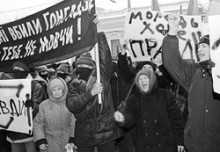Kyiv has seen an organized traffic- blocking street procession aiming to express distrust in the authorities. A host of flags, a long stream of people, a few clashes between the opposed groups on Khreshchatyk, which always produces a spectacular effect on television, the tempestuous tirades of some politicians who are used to casting aspersions on the rulers. And what next? The impression is that the people involved in this do not know themselves what their next move will be.
The weak point of this procession is complete silence about who Ukraine is going to be with if not with Leonid Kuchma. Obviously, the nomination or at least naming of such a candidature will immediately split the opposition. For example, Heorhy Kriuchkov says on behalf of the Communist Party that they oppose developments leading to Viktor Yushchenko assuming the office of president. So a certain camouflage is suitable, but not always fair, in this matter.
What was the opposition’s strong point was the well-organized and spectacular effect of the procession. The latter included burning an effigy, a plethora of multicolored flags, and even the attempt to replay the Yugoslav poster war scenario. As far as television coverage is concerned, the opposition clearly looked successful: the screen showed everything that is appropriate in such cases. The familiar streets were packed with people carrying banners. This video spot pursued two goals: to show the weakness of the authorities and power of the opposition. The latter aspect was accentuated by the fact that columns have marched in from various regions, thus creating the illusion of nationwide agitation.
What were the strong and weak points of the authorities in this confrontation? Among the strong points is one that the authorities did not succumb to the temptation to ban or disperse the demonstration. Otherwise, the face-off would have reached a new level, and foreign screens would have shown quite different footage. This was demonstrated quite well when force was applied during the patriarch’s funeral on St. Sophia Square. Perhaps this was expected to happen again. But it did not: cameramen had to film clashes within the opposition itself, although these may have been provoked.
Among the weak points is the utter loss of the ability to react. The authorities kept so low a profile that they became unrecognizable. They took the position of a safe-distance onlooker, which was also the wrong thing to do. The authorities, by their very virtue, are supposed to speak as much as possible with their people, the more so if some representatives of the latter raise claims. Even if the authorities consider these unfounded, misleading or paid for by somebody, they should understand that the general public only sees the television and does not see the hidden implications leading to one event or another. The viewers never saw even one representative of the authorities, who would defend their stand in clear terms. The authorities demonstrated long silence, if not complete muteness. The ability to keep a pause is one of the peaks of theatrical art, but is it equally applicable in politics?
What is opposition, and what are its functions in the modern world? The opposition is supposed to follow the authorities step by step, noting what the latter are doing wrong and suggesting other options, with public opinion and, during the elections, all the people being the judge in their disputes.
What functions can the opposition perform in our case?
Information. The opposition informs the population about the authorities’ wrong actions. The opposition can call the authorities to account regarding some of their actions, thus promoting the maximal transparency of the official rule.
Cooperation. The opposition interacts and cooperates with the authorities in order to solve the problems caused, from the viewpoint of the former, by wrong governmental actions. Moreover, the authorities must be supported and pushed toward the settlement of such issues.
Resistance. The opposition severely condemns the wrong actions of the authorities. This condemnation should inevitably cause society to exert pressure on the authorities to make the latter react to this manifestation of feedback. There can be no effective power without properly functioning feedback.
But all this is possible if the opposition recognizes the inviolability of some crucial foundations on which national security rests. From this perspective, the opposition should assume a systemic nature. It always takes up the authorities in all states. But still it does not aim to turn the whole country upside down. One more delicate point: the opposition should not feed off foreign financial aid, because in this case it begins to pursue the interests of people other than its own.
The authorities have also committed a series of mistakes that led to this type of crisis. The authorities should react to criticism in clear-cut and easy-to-grasp terms. Accordingly, the authorities must not regard the opposition as an enemy of the people. The opposition reflects the interests of some groups of the population as concrete as those who elected the authorities.
There should be a political debate. The more we hide from it, the more sore points are laid by for an indefinite period of time. But Ukraine has no indefinite periods. All its periods are quite short and definite. Unfortunately, our information infrastructure works badly, if at all. We cannot hear from the small screen the opinion of politicians, experts, and the public. The television machine has turned in on itself, placing a taboo on all other themes.
Any civilized state should have an opposition and authorities. They should be able to find ways to hear each other. But the main and most basic element in this pattern is the people. Both the opposition and the authorities should hear their people. Otherwise we will be marking time, sadly looking at the same faces and the same events occurring over and over again.







